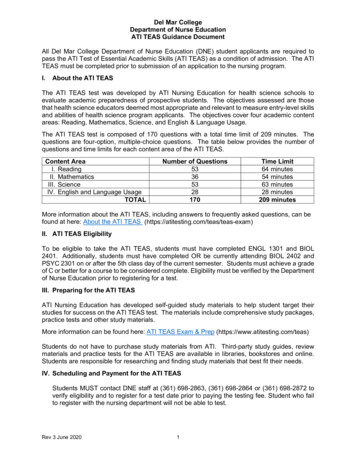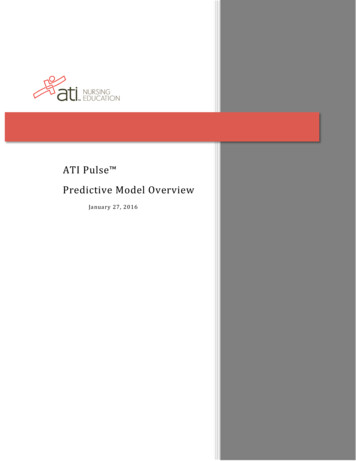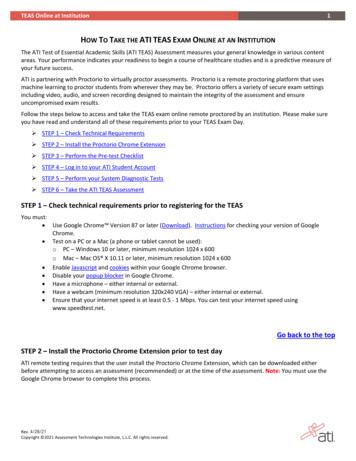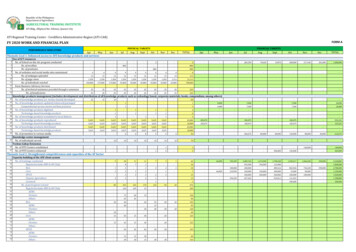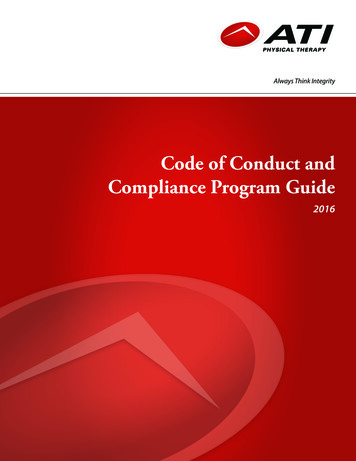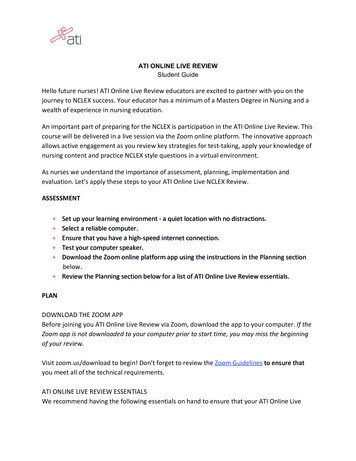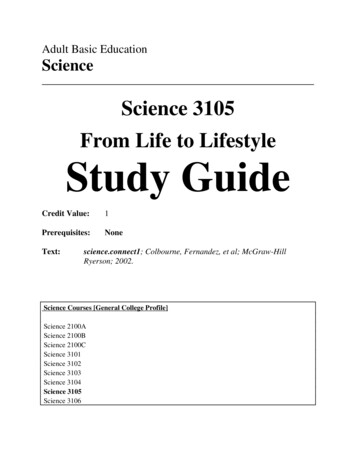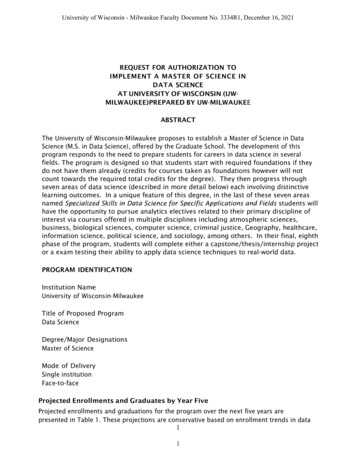
Transcription
University of Wisconsin - Milwaukee Faculty Document No. 3334R1, December 16, 2021REQUEST FOR AUTHORIZATION TOIMPLEMENT A MASTER OF SCIENCE INDATA SCIENCEAT UNIVERSITY OF WISCONSIN (UWMILWAUKEE)PREPARED BY UW-MILWAUKEEABSTRACTThe University of Wisconsin-Milwaukee proposes to establish a Master of Science in DataScience (M.S. in Data Science), offered by the Graduate School. The development of thisprogram responds to the need to prepare students for careers in data science in severalfields. The program is designed so that students start with required foundations if theydo not have them already (credits for courses taken as foundations however will notcount towards the required total credits for the degree). They then progress throughseven areas of data science (described in more detail below) each involving distinctivelearning outcomes. In a unique feature of this degree, in the last of these seven areasnamed Specialized Skills in Data Science for Specific Applications and Fields students willhave the opportunity to pursue analytics electives related to their primary discipline ofinterest via courses offered in multiple disciplines including atmospheric sciences,business, biological sciences, computer science, criminal justice, Geography, healthcare,information science, political science, and sociology, among others. In their final, eighthphase of the program, students will complete either a capstone/thesis/internship projector a exam testing their ability to apply data science techniques to real-world data.PROGRAM IDENTIFICATIONInstitution NameUniversity of Wisconsin-MilwaukeeTitle of Proposed ProgramData ScienceDegree/Major DesignationsMaster of ScienceMode of DeliverySingle institutionFace-to-faceProjected Enrollments and Graduates by Year FiveProjected enrollments and graduations for the program over the next five years arepresented in Table 1. These projections are conservative based on enrollment trends in data11
University of Wisconsin - Milwaukee Faculty Document No. 3334R1, December 16, 2021analysis courses taught in different departments and colleges at UWM from Fall ‘2015 toSpring Summer ‘2021. By the end of Year 5, we expect about 125 students to be enrolledin the program over its five years and a total of 73 students to have graduated. Theseprojections are based on an average retention rate of 75% each year (based on data forUWM). We also assume that 95% of the 25% of students who don’t continue from theacademic year in which they enrolled through the end of the next academic year leavebecause they graduated. This results in an overall graduation rate of 68.3% among allstudents entering the program. Although the Graduate School does not currently havereliable overall data for graduation rates, this is consistent with their conservative estimatesof master’s graduation rates. Given the increasing demand for data analysts, these numbersalso assume that students enrolling in this program are net additions to the campus’current total matriculants.Table 1: Five-Year Degree Program Enrollment ProjectionsYearCategory ofStudentsNew StudentsContinuingTotal EnrollmentGraduatingTotal 26436110452785283135491270Tuition StructureThe standard tuition and fee applicable for all UWM students also apply for students enrolled inthe M.S. in Data Science program. For the current academic year, residential tuition andsegregated fees total 5,931.82 per semester for a full-time student enrolled in 8 credits persemester. Of this amount, 5,350.32 is attributable to tuition. Nonresident tuition andsegregated fees total 12,647.34 per semester for a full-time student enrolled in 8 credits persemester. Of this amount, 12,065.84 is attributable to tuition. Additionally, some coursedelivery will be in Schools which charge ‘Master’s Surcharge Fees’. For example, BusinessMaster’s charges 167.71 per credit for courses taken in the Lubar School of Business.College, School, or Functional EquivalentGraduate SchoolProposed Month and Year of ImplementationFall 2022DESCRIPTION OF PROGRAMOverview of the ProgramStudents applying to the program are expected to have proficiency, demonstratedthrough coursework, exams and/or a portfolio, in the following areas: Linear Algebra (322
University of Wisconsin - Milwaukee Faculty Document No. 3334R1, December 16, 2021credits), Multivariable Calculus (4 credits), Statistics (3 credits), and Computer Literacy (6credits). Those without these proficiencies may be admitted when they have 6 credits orfewer of the proficiency requirements remaining to be completed, but proficiencycoursework does not count towards the MS.The degree itself consists of 30 credits in all composed of the following areas:1. Developing insights from data, for applications (3 Credits)2. Organizing and maintaining large data sets. (3 Credits)3. Methods like AI, and Machine Learning to extract insight from Data (3 Credits)4. Knowledge and skills for using probabilistic methods to analyze uncertainty in dataand develop insights (3 credits)5. Advanced Programming for Data Collection and Data Science (3 Credits)6. Understand the importance of, and skills for, the ethical use of data (3 Credits)7. Specialized Skills in Data Science for Specific Applications and Fields (12 Credits)8. An optional capstone course/thesis/internship experience (3 credits) can besubstituted for 3 of the 12 credits in area9. Students who do not pursue the capstone course/thesis/internship experienceoption will also be required to pass an exam that tests their ability to develop asolution for a problem using data and data science techniques learned during theprogram. The specialization category allows for future implementations of dualdegree programs, transcript designated concentrations, etc.Student Learning Outcomes and Program ObjectivesThe core objective of the MS in Data Science is to prepare students for advanced careersin data science in multiple fields. The program is designed to allow students to progressthrough the seven areas mentioned above in the overview of the program. Six of theseven areas are core areas designed to give them skills needed to be strong and ethicaldata scientists. Specifically, they will (1) develop insights from data, for applications, (2)learn how to work with large data sets, (3) gain experience in advanced computerprogramming for data science (4) become skilled in specific areas of data science such asartificial intelligence and machine learning (5) understand how to deal with uncertaintywhich is an inherent characteristic of data science and (6) recognize and internalize theimportance of ethical use of data and data science. First, they will gain a strongunderstanding of the foundations of data analytics including linear algebra, calculus,statistics, and computer programming (as mentioned above, courses taken towardsbuilding these foundations if required do not count towards the total credits required forthe degree). Second, they will take courses in six core areas that represent thefundamentals of data analytics, including programming languages, databases, analytics,big data, data mining and visualization, statistics, communication, and ethics. A studentcan choose to reinforce the core knowledge in these key areas through a capstonecourse, an internship or a thesis. Enrollment in a thesis or internship is subject to theapproval of the Program Director and the signature of a faculty member willing to guidethe thesis or internship. Students who do not pursue the capstonecourse/thesis/internship option will be required to pass a Master’s ComprehensiveExamination. The Program Director (discussed below) will be responsible for getting the33
University of Wisconsin - Milwaukee Faculty Document No. 3334R1, December 16, 2021appropriate Comprehensive Examination written by a faculty member for the student whois taking the exam and also getting the exam graded by that faculty member. During thisexam, students are given a data set and a research problem to be addressed with thedata, using data science techniques. Students must submit a final report in which theyuse the provided data set to address the research question and demonstrate that theyhave developed a sufficient level of expertise to work as a data scientist. This is a takehome exam and students have seven days to complete it. Third, in a unique feature ofthis degree, students will have the opportunity to choose and pursue electives related totheir primary discipline of interest via courses offered in multiple disciplines includinganthropology, business, biological sciences, computer science, GEOGraphy and sociologyamong others.The overall targeted outcome of the program is to develop graduates who will Apply the concepts of data science inter-disciplinarily to problems in a variety offields and industries. Be equipped to pursue a data science oriented career path in the discipline thatthey are passionate about. Appreciate and abide by ethical uses of data and insights from the use of datascience.Program Requirements and CurriculumFor admission to the M.S. in Data Science program, students must meet the generalrequirements of admission to a graduate program at UW-Milwaukee. As stated by theGraduate School, these requirements include: (1) a baccalaureate degree, or its equivalent asdetermined by the UWM Center on International Education, from a regionally accreditedinstitution, completed before the first term of enrollment in the Graduate School (2)Proficiency in the English language and (3) A minimum cumulative undergraduate grade pointaverage (GPA) of 2.75 on a 4.0 scale, or an equivalent measure on a grading system that doesnot use a 4.0 scale. Students applying to the program are expected to have proficiency,demonstrated through coursework, exams or a portfolio, in the following areas: LinearAlgebra (3 credits), Multivariable Calculus (4 credits), Statistics (3 credits), and ComputerLiteracy (6 credits). Those without these proficiencies may be admitted when they have 6credits or fewer of the proficiency requirements remaining to be completed, butproficiency coursework does not count towards the MS.Table 2 illustrates the program curriculum for the proposed program. The programrequirements are comprised of 30 credits, of which there are 18 credits across the six coreareas, 12 credits of general electives in the seventh area for Specialized Skills in DataScience for Specific Applications and Fields of which 3 credits may be fulfilled with acapstone course. Enrollment in an internship or thesis subject to the approval of theProgram Director and the signature of a faculty member willing to guide the thesis orinternship.44
University of Wisconsin - Milwaukee Faculty Document No. 3334R1, December 16, 2021Table 2: Master of Science in Data Science Program CurriculumDeveloping insights from data for applications (3 Credits)1 of the following 3 coursesATM SCI 600Data AnalyticsINFOST 687Data Analysis for Data ScienceCOMPSCI 425(G) Introduction to Data MiningOrganizing and maintaining large data sets (3 Credits)1 of the following 8 coursesINFOST 785Database Management systems for information professionalsINFOST 714MetadataINFOST 780XML for LibrariesINFOST 783Information Storage and RetrievalINFOST 691Data Management and CurationCOMPSCI 557Database SystemsPH 718Data Management and Visualization in RBUS ADM 749Data and Information ManagementAI, and Machine Learning to extract insight from Data (3 Credits)Take 1 of the following 7 coursesINFOST 582Introduction to Data ScienceBUS ADM 795Seminar-in-Management: Ideas & Applications of Data Science InDifferent FieldsCOMPSCI 422GIntroduction to Artificial IntelligenceCOMPSCI 710Artificial IntelligenceCOMPSCI 411GMachine Learning and ApplicationsCOMPSCI 711Introduction to Machine LearningMATH 702Industrial MATH 2Probabilistic methods to analyze uncertainty in data (3 credits)1 of the following 19 coursesATM SCI 500Statistical Methods in Atmospheric SciencesATM SCI 700Statistical Methods in Atmospheric Sciences II: Signal DetectionBUS ADM 754Statistical AnalysisBUSMGMT 709Predictive Analytics for ManagersBUS ADM 713Business Forecasting MethodsBUS ADM 714Multivariate Techniques in Mgmt ResearchIND ENG 575Design of ExperimentsIND ENG 765Operations Research MethodsSOCIOL 461GSocial Data Analysis Using Regression55
University of Wisconsin - Milwaukee Faculty Document No. 3334R1, December 16, 2021SOCIOL 760SOCIOL 982PSYCH 510GPSYCH 610GPOL SCI 390GPOL SCI 701POL SCI 702ECON 411GECON 413GECON 513GGEOG 747PH 711PH 818GEOG 827COMPST 701MTHSTAT 361GMTHSTAT 362GMTHSTAT 563Gor 763MTHSTAT 546Gor 764MATH 571GCOMPSCI 720MTHSTAT 761MTHSTAT 762ED PSY 724ED PSY 820Advanced Statistical Methods in SociologyAdvanced Quantitative AnalysisAdvanced Psychological StatisticsExperimental DesignPolitical Data AnalysisTechniques of Political Science ResearchAdvanced Techniques of Political Science ResearchEconomic Forecasting MethodsStatistics for EconomistsIntroduction to EconometricsSpatial AnalysisIntermediate Biostatistics"Statistical Computing (""This course will cover the theory andapplication of common algorithms used in statistical computing.)"Qualitative ResearchMathematical & Computing Fundamentals for IT ProfessionalsIntro Prob/Stats IIntro Prob/Stats IIRegressionTime Series AnalysisProbability ModelsComputational models for decision makingMathematical Statistics IMathematical Statistics IIEducational Statistical Methods IIMultiple Regression and Other General Linear ModelsAdvanced Programming for Data Collection and Data Science (3 Credits)1 of the following 8 coursesBUSMGMT 744R Programming for Business AnalyticsCOMPST 702Software Development in PythonGEOG 748ArcGIS Programming with PythonURBPLAN 794Internet Geographic Information SystemsCOMPST 751Data Structures and AlgorithmsMTHSTAT 566Gor 766Computational StatisticsEthics (3 credits)1 of the following 7 coursesINFOST 660Information PolicyINFOST 661Information Ethics66
University of Wisconsin - Milwaukee Faculty Document No. 3334R1, December 16, 2021INFOST 583Survey of Information SecurityINFOST 784Information Security ManagementINFOST 761Information PrivacyINFOST 465GLegal aspects of info products & services (G)BUS ADM 743Information Privacy, Security, and ContinuityElectives (12 credits)Take 4 of the following 52 coursesINFOST 691BUS ADM 741BUS ADM 812BUS ADM 813BUS ADM 817BUS ADM 742BUS ADM 745BUS ADM 763BUS ADM 769BUS ADM 816COMPSCI 712COMPSCI 423GCOMPSCI 723COMPSCI 444Gor 744COMPSCI 469GCOMPSCI 535GCOMPSCI 704COMPSCI 759Comp Sci 725Comp Sci 755SOCIOL. 750SOCIOL. 752SOCIOL 952POL SCI392GGEOG 704GEOG 705GEOG 716GEOG 726GEOG 804GEOG 826GEOG 834GEOG 904GEOG 926GEOG 960GEOG 999URBPLAN 692PH 812URBPLAN 791URBPLAN 792Artificial Intelligence and Disruptive TechnologiesWeb Mining and AnalyticsMachine Learning for Business.Social Media Analytics for BusinessConnected Systems for BusinessBig Data in BusinessArtificial Intelligence for BusinessMarketing AnalyticsDatabase MarketingBusiness Intelligence Technologies & SolutionsImage ProcessingNatural Language ProcessingNatural Language ProcessingText RetrievalSecurityAnalysis of AlgorithmsAnalysis of AlgorithmsData SecurityRobot Motion PlanningInformation and Coding TheoryResearch Methods in SociologyFundamentals of Survey MethodologySocial Network AnalysisSurvey ResearchRemote Sensing: Environmental and Land Use AnalysisCartographyWatershed Analysis and ModelingGeographic Information ScienceAdvanced Remote SensingIntermediate Geographic Information ScienceGIS and SocietyRemote Sensing and Urban AnalysisAdvanced Geographic Information Science: Geographic ModelingSeminar: Geographic TechniquesIndependent Work (with appropriate topic)Special Topics in Urban Planning: Transportation Planning and GISStatistical Learning and Data MiningIntroduction to Urban Geographic Information Systems for PlanningUsing Urban Geographic Information Systems for Planning77
University of Wisconsin - Milwaukee Faculty Document No. 3334R1, December 16, 2021URBPLAN 999ANTHRO 380ANTHRO 562ANTHO 768CRM JST 520GCRM JST 713CRM JST 716CRM JST 910ART 526GART 316 GART 317 GART 427 U/GART 313 U/GIndependent StudyAnthropological Applications of GISTechniques and Problems in ArchaeologyTopics in Advanced Research Design in AnthropologyAnalysis Oriented Technology: Spatial Data Analysis; Crime Mapping;ArcGISMeasuring Crime & Analyzing Crime DataAdvanced Analytic Techniques for Crime AnalystsMethods and Practice Capstone for Crime AnalystsResearch in Universal Design and FabricationInteractive and Multimedia Art3D Imaging ISpecial Topics CourseInteractive and Multimedia Art and Programming for ArtistsED PSY 720MATH 701Techniques of Educational and Psychological MeasurementIndustrial MATH 1ED PSY 821ED PSY 822ED PSY 823ED PSY 824ED PSY 825ED PSY 826ED PSY 827ED PSY 832BIO SCI 469BIO SCI 502BIO SCI 572Psychometric Theory and PracticeModern Test TheoryStructural Equation ModelingAdvanced Experimental Design and AnalysisMultivariate MethodsAnalysis of Cross-Classified Categorical DataSurvey Research Methods in EducationTheory of Hierarchical Linear ModelingGenomic Data AnalysisIntroduction to Programming and Modeling in Ecology and EvolutionFunctional Genomics* Every student’s program of electives must be approved by the program director; studentsmay be able to count as Electives some courses in the “core” categories not applied to thecore requirements (subject to Director’s approval). Students wishing to apply other coursesnot listed here towards these electives must have each course approved by the programdirectorOptional: Internship/Thesis/CapstoneOf the required 12 elective credits, up to 3 degree credits may be awarded for a thesis orinternship. Students who choose this option must complete a relevant thesis or internshipthat is approved by the program director. Students who choose to complete a thesis mustwork with a thesis advisor and have the thesis approved by the advisor and the programdirector. Students who choose to pursue an internship must also obtain approval from theprogram director. Students may select from courses such as those listed below or enrollfor thesis credits with their thesis advisor (in the advisor’s department).INFOST 790GEOG 798URBPLAN 793URBPLAN 991MATH 790COMPSCI 990Project Design, Implementation, and EvaluationGIS/Cartography InternshipApplied Projects in Urban Geographic Information SystemsLegislative/Administrative Agency InternshipMaster's ThesisMaster’s Thesis88
University of Wisconsin - Milwaukee Faculty Document No. 3334R1, December 16, 2021COMPSCI 995Qualifying ExamMaster's Capstone ProjectStudents who do not choose to pursue the optional capstone course/thesis/internshipoption are required to pass a qualifying exam. During this exam, students are given adata set and a research problem to be addressed with the data, using data sciencetechniques. Students must submit a final report in which they use the provided data set toaddress the research question and demonstrate that they have developed a sufficient levelof expertise to work as a data scientist. This is a take-home exam and students haveseven days to complete it.Assessment of Outcomes and ObjectivesAs mentioned above, all students will need to either pursue the optional capstonecourse/thesis/internship option or take a qualifying exam to complete the requirements ofthe degree. Performance in the capstone course/thesis/internship or the qualifying examwill serve as the primary vehicle for the assessment of outcomes and objectives. Inaddition, As is the case with all advanced degrees at UWM, the program will go through acampus-coordinated assessment exercise required for Higher Learning Commission (HLC)accreditation. Courses in several of the participating colleges and departments also gothrough their own accreditation periodically. For example, courses in Computer Science areregularly assessed as part of the Accreditation Board for Engineering and Technology (ABET)accreditation process. Similarly, degrees in the Lubar School of Business go through anaccreditation process by American Association of Collegiate Schools of Business (AACSB)and hence courses in the degrees that are part of the proposed degree will also beassessed. A specific assessment of the learning outcomes and objectives of theM.S. in Data Science program will also be conducted by regularly surveying graduates of theprogram.DiversityThe M.S. in Data Science program seeks to prepare students from diversebackgrounds by providing them the expertise to gain employment in the rapidly growingjob markets for data science. This will therefore result in an increase in the participationof women and minorities in the programs. Additionally, 35% of undergraduate students atUWM are first-generation students and 32% are students of color. By providing them theopportunity to continue on after completing their undergraduate studies at the university,the proposed program will serve their higher education needs and thus serve these diversestudent populations. The program’s curriculum also includes several courses that willprovide students several opportunities to learn about, and practice, the importance ofdiversity of people, points of view, and theoretical perspectives through the required Ethicscomponents of curriculum.Program ReviewConsistent with the policies and procedures of the University of WisconsinMilwaukee, the proposed program will be reviewed by a faculty oversight committee(FOC) every five years to ensure that the degree continuously meets the needs of99
University of Wisconsin - Milwaukee Faculty Document No. 3334R1, December 16, 2021students and employers. The FOC will also be responsible for governance of thedegree. The degree will be managed by a Program Director who will be appointed bythe FOC.Rationale and Relation to MissionThe UW-Milwaukee Select Mission Statement (https://uwm.edu/mission/) states:“To fulfill its mission as a major urban doctoral university and to meet the diverse needs ofWisconsin’s largest metropolitan area, the University of Wisconsin–Milwaukee must providea wide array of degree programs, a balanced program of applied and basic research, and afaculty who are active in public service. Fulfilling this mission requires the pursuit of thesemutually reinforcing academic goals”. Among the several goals listed in this statement,the MSDS program especially contributes to the following: “To further academic and professional opportunities at all levels for women,minority, part-time, and financially or educationally disadvantaged students. To establish and maintain productive relationships with appropriate public andprivate organizations at the local, regional, state, national, and international levels. To promote public service and research efforts directed toward meeting the social,Economic and cultural needs of the state of Wisconsin and its metropolitan areas. To provide educational leadership in meeting future social, cultural, andtechnological challenges.”Given the rapid and continuing growth in the use of data science across all sectors ofpublic and private activities, the proposed degree with increase professional opportunitiesfor all students that enroll in the program and especially disadvantaged students byproviding them with highly sought skills and training. This, in turn, will expand andstrengthen UWM’s relationships with both public and private organizations that are in needof the skills. Additionally, graduates of the program will be well-trained to supportresearch using data science where needed and help their employers meet the technologicalchallenges and opportunities presented by the growing use of vast amounts of data inevery sector of society.Other Programs in the University of Wisconsin SystemThere is only one Master’s degree in Data Science currently being offered through theUW Data Science Collaborative program at UW- Eau Claire, UW-Green Bay, and UW-LaCrosse. The degree however focuses on different areas of data science like data miningand visualization and does not include applications to specific disciplines. On the otherhand, our program aims to provide multi and inter-disciplinary training. Such trainingis increasingly sought by employers and advocated by scholars. A workshop convenedby the National Research Council’s Committee on Applied and Theoretical Statistics;Board on Mathematical Sciences and Their Applications; Division on Engineering andPhysical Sciences (https://www.ncbi.nlm.nih.gov/books/NBK299101/) recommendsthat academic data science and data analytics programs should be designed to be interdisciplinary all through and also foster collaborative skills. This proposed program isthus designed to be consistent with employer needs and recommendations by nationalscholars and also does not create unnecessary duplication.1010
University of Wisconsin - Milwaukee Faculty Document No. 3334R1, December 16, ) recommends that academic datascience and data analytics programs should be designed to be inter-disciplinary allthrough and also foster collaborative skills.Need as Suggested by Current Student DemandWe have been tracking student enrollment in 140 courses on our campus identified asimparting skills related to data analytics. The chart below shows the averageenrollments in these classes, in terms of average total student credit hours per class,during each semester since 2015. As demonstrated by the chart, there has been asignificant increase since 2019 in student interest in these classes.Need as Suggested by Market DemandA report from the employment outlook firm Burning Glass produced jointly with IBM andthe Business Higher Education Forum identified several job categories in the data scienceand analytics field, including data driven decision makers (“leverage data to informstrategic and operational decisions”) and functional analysts (“utilize data and analyticalmodels to inform specific functions and business decisions”). They estimated a nationaldemand of 1.8 million job postings nationwide for 2020, with a 5-year growth rate ofapproximately 15%. Importantly, the report also states: “39% of Data Scientists andAdvanced Analysts require a Master’s or Ph.D. These degrees take additional years ofschooling to complete, so it will take a significant time investment to train a larger poolof workers. Therefore, because these roles are already undersupplied and projected togrow rapidly, the skills shortage is in danger of worsening.”The Bureau of Labor Statistics ists.htm) also projects thatComputer and Information Research Scientists category of jobs will grow 15% over the2019-2029 period and describes this as: “ much faster than average for all occupations.Job prospects are expected to be excellent” and states that the “median annual wage forcomputer and information research scientists was 126,830 in May 2020.” BLS alsoclassifies this as a category in which most jobs require a Master’s degree.Additional evidence of demand is also seen in investments made by employers likeNorthwestern Mutual that have invested significant resources of 15 million in the1111
University of Wisconsin - Milwaukee Faculty Document No. 3334R1, December 16, 2021establishment of the Northwestern Mutual Data Science Institute to support the launchand growth of undergraduate and graduate programs related to data including datascience and data analytics.1212
Education Committee Item X.Attachment CCOST AND REVENUE PROJECTIONS NARRATIVEUNIVERSITY OF WISCONSIN-MILWAUKEEMasters in Data ScienceIntroductionThe University of Wisconsin – Milwaukee proposes to establish a Master of Sciencein Data Science (MSDS) to be housed in the Graduate School. The program is designed sothat students start with required foundations if they do not have them already. They thenprogress through seven areas of data science (described in more detail below) eachinvolving distinctive learning outcomes. In a unique feature of this degree, the last of theseseven areas named Specialized Skills in Data Science for Specific Applications and Fieldsstudents have the opportunity to pursue analytics electives related to their primarydiscipline of interest via courses offered in multiple disciplines including atmosphericsciences, business, biological sciences, computer science, criminal justice, geography,healthcare, information science, political science, and sociology, among others.Section I – EnrollmentWe anticipate the Masters in Data Science major to attract 25 new students in yearone with an escalation of enrollment over five years up to 52 new students by the start ofyear five. Of these 25 new students, we anticipate 5 of them to be transfers. We alsoassume that we will have a retention rate of 75%. Student FTE assumption is that 80% ofstudents will enroll in the program part-time.Section II Credit HoursCredit hours are conservatively estimated using 16 credit hours per student FTE inthe program.Section III – Faculty and Staff AppointmentsThe courses for this major are courses that exist as part of other majors. Therefore,instruction in the Data Sciences major will be delivered by existing faculty and instructionalacademic staff as part of their normal course load. No additional hires of faculty or staff areanticipated. At present there is enough existing capacity (empty seats) in classes or classeswhere the enrollment cap can be raised to accommodate the projected new students inthe Data Sciences major without needing new sections or faculty. As the major grows, wemay need to increase course offerings. That increase will only be done when enrollmentnumbers support such increases.Page 1 of 3
Education Committee Item X.Attachment CSection IV – Program RevenuesTuition Revenues Tuition revenues were calc
AT UNIVERSITY OF WISCONSIN (UW-MILWAUKEE)PREPARED BY UW-MILWAUKEE . ABSTRACT . . (GPA) of 2.75 on a 4.0 scale, or an equivalent measure on a grading system that does not use a 4.0 scale. Students applying to the program are expected to have proficiency, demonstrated through coursework, exams or a portfolio, in the following areas: Linear .
